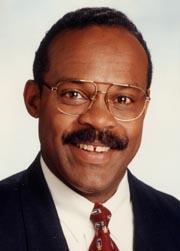American Successes: Wayne Curry and Paul Mazursky
By • July 7, 2014 0 1275

WAYNE CURRY
Wayne Curry, the transformative Prince George’s County executive for two terms in the 1990s, believed in the power of economic development and prosperity, and he fought for it with steel-strong toughness, charm, and authentic authority.
Curry, who died of lung cancer July 2 at the age of 63, gained wealth and prospered as a real estate and corporate lawyer, and held the firm belief that opportunities existed for others to do what he did. The result was that when he came to power as one of the first African American county executives in the nation, Prince George’s County, which is now more than 60-percent black, became one of the first county or city jurisdictions in the nation to go from a white majority to an African American majority with its economy prospering and improving, along with the level of education among its residents.
He also did something else that was unique. He stood up to the imposing and bullish Jack Kent Cooke, the owner of the Washington Redskins who was used to getting his way. In the 1990s, Cooke had already decided to bring the Redskins from RFK Stadium in Washington, D.C., to Landover, Md., in Prince George’s County and demanded that the county pay for the resulting $175-million stadium. Curry bluntly said no, causing consternation among Maryland state politicians who were afraid that Cooke might back out. But Curry stood fast—and it was the state that ended up picking up the tab, not Curry or Prince George’s County.
He could be confrontational. He clashed with Wall Street over the county’s bond rating, but eventually prevailed. He laid the groundwork for the rise of National Harbor and made sure that the county was first and foremost prosperous. In addition, crime went down under Curry, and businesses came to the county. Washington’s loss of African American residents was the county’s gain. It is the country’s wealthiest black-majority county. What Curry sought was respect for the county, which includes College Park and Laurel among its cities. He got it with economic growth, the completion of the integration of schools, an integrated police force, and the raising of the county’s image and profile among its neighbors.
High praise for Curry came from Maryland leaders like Governor Martin O’Malley, Lieutenant Governor Anthony Brown, who just won the Democratic primary for governor, GOP candidate for Governor Larry Hogan, the current Prince George’s County Executive Rushern Banker III, Rep. Donna Edwards, D-Md., and House Minority Whip Steny Hoyer.
PAUL MAZURSKY
Paul Mazursky, the noted American film director of the 1970s and 1980s, had a way with words. He also had a way with actors, and he was a keen observer of American social, sexual and cultural mores of those decades.
Which is not to say he was Woody Allen, although, oddly enough, he directed Woody Allen in a movie with Bette Midler. Mazursky’s best work was in some fleshy, colorful way, much warmer, less idiosyncratic, and without the cool and too-hip intellectual baggage that characterized Allen’s lesser work.
Mazursky took a long time getting started—it wasn’t until he and his writing partner Larry Tucker came up with the screenplay for “I Love You Alice B. Toklas,” a film in which the endlessly inventive comic actor Peter Sellers plays a middle-aged man getting lost in a cloud of acid, fringed jackets and a hippie goddess, played by Leigh Taylor Young, that his directing gear took off.
When he stayed away from self-indulgent, navel-gazing and semi-autobiographical films like “Blume in Love,” “Alex in Wonderland” and “Willie and Phil,” he ran off a series of films that were notable for their full-of-life, sharply observed, empathic, funny, often romantic as well as satiric films. They were small classics. First in line was the still famous but also slightly dated “Bob & Carol & Ted & Alice” (1969) about two cool couples wandering awkwardly into a sexual-swinging scene. The performance were top-notch—Natalie Wood, Robert Culp, young Elliott Gould and a surprisingly sweet Dyan Cannon. In its day, it was considered “too dirty” by some studio heads. Today, it would probably grace the Lifetime network.
“Harry and Tonto,” about an elderly man who embarks on a cross-country road trip with his pet cat after being evicted from his New York apartment, was a gem, and a triumph for Art Carney, previously known for his work on “The Honeymooners.” It was funny, warm, full of terrific performances—including Chief Dan George, and Larry Hagman and Ellen Burstyn as his children. It won Carney an Oscar for best actor.
In “An Unmarried Woman,” the luminous, sometime brittle star of the 1970s Jill Clayburgh plays a woman at sea in a changing sexual world after being dumped by her husband. She’s surrounded by wonderful actors, including Michael Murphy as the husband and Alan Bates, providing magnetic love interest as a bearded painter.
You go down that list, and you keep finding memorable work—“Moscow on the Hudson” with Robin Williams as Russian who defects in Bloomingdale’s and courts Maria Conchita Alonzo; “Down and Out in Beverly Hills” with Richard Dreyfus and Bette Midler as Hollywood types, whose lives are upended by the presence of a grungy, scruff Nick Nolte as a homeless person they’ve taken in.
His last really great movie was “Enemies: A Love Story,” based on Isaac Bashevis Singer’s novel about a Holocaust survivor who ends up marrying three amazing women. At the same time.
Mazurzky died of cardiac arrest at the age of 84 June 30.
- Wayne Curry; January 6, 1951 – July 2, 2014



